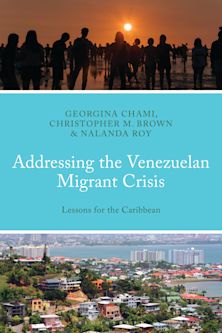- Home
- ACADEMIC
- Politics & International Relations
- Politics - Other
- Education, Social Progress, and Marginalized Children in Sub-Saharan Africa
Education, Social Progress, and Marginalized Children in Sub-Saharan Africa
Historical Antecedents and Contemporary Challenges
Education, Social Progress, and Marginalized Children in Sub-Saharan Africa
Historical Antecedents and Contemporary Challenges
You must sign in to add this item to your wishlist. Please sign in or create an account
Description
This book employs sociohistorical, narrative, and discourse frameworks to discuss the sociopolitical complexities and ambiguities of educating marginalized groups in sub-Saharan Africa since western education was introduced in the region. It outlines the systemic and structural challenges faced by marginalized children in the education system that prevent them from fully participating in the education process. This book focuses on how the props underlying Christian missionary education, colonial education, and early postcolonial educational enterprise all served to marginalize certain groups, including women, some geographical regions and/or communities, such as Islamic communities and people with disabilities, from the colonial and postcolonial economic discourses. This historical background provides the springboard for discussions on the complexities and ambiguities of educating marginalized groups in some communities in sub-Saharan Africa in the contemporary times. This book also highlights the challenges of the recent policies of policy makers and the strategies and initiatives of civic societies, non-governmental organizations, and local communities to promote marginalized children’s participation in education. This book elucidates the varied ways certain groups and communities continue to interrogate the structural and systemic challenges that marginalize them educationally. It argues that the level of marginalized groups’ participation in education in sub-Saharan African in the 21st century will determine the progress the region will make in the Education for All (EFA) initiative and the Millennium Development Goals (MDG). Furthermore, it argues that increasing educational participation in marginalized communities requires implementation of educational programs that address marginalized groups’ structural social arrangements and socioeconomic contexts.
Table of Contents
Preface
Part I: Historical Antecedents of Education Marginalization
Chapter 1: Socio-Historical Analysis of Western Educational Development in Sub-Saharan Africa
Chapter 2: Women and Schooling in Sub-Saharan Africa from Colonial to Contemporary Times
Chapter 3: Perspectives on Gender Violence and Girls’ Education in Sub-Saharan Africa, co-authored by Obed Mfum-Mensah and Milka Perez Nyariro
Chapter 4: Education Marginalization and the Contours of Educating People with Disabilities in Sub-Saharan Africa
Chapter 5: Universities, Teacher Preparation, and Education of People with Disabilities: Lessons from Kenya, co-authored by Obed Mfum-Mensah and Milka Perez Nyariro
Part II: Education Marginalization in Practice
Chapter 6: Non-Formal Approaches for Educating Pastoral Communities
Chapter 7: Sociopolitical Complexities of the Decentralization Policy in Rural Remote Communities
Chapter 8: Community Ownership of Curriculum Development for Promoting Education in Marginalized Communities
Chapter 9: Language and Education Marginalization in Sub-Saharan Africa: Lessons from Marginalized Communities in Northern Ghana
About the Authors
Product details
| Published | 04 May 2017 |
|---|---|
| Format | Ebook (Epub & Mobi) |
| Edition | 1st |
| Extent | 240 |
| ISBN | 9781498545709 |
| Imprint | Lexington Books |
| Illustrations | 8 Tables |
| Publisher | Bloomsbury Publishing |
About the contributors
Reviews
-
The author gives a good historical account of four centuries of history that have created marginalised adults for generations who have in turn become parents of marginalised children . . . My general reaction to the book as one who has lived and taught in West Africa is that it is an immensely detailed and well-referenced overview of the factors which have led to marginalisation.
International Review of Education
-
This book is a refreshingly thorough intersectional analysis of class, gender, geography, and religion and their interplay in the provision of education to children in sub-Saharan Africa. It is very well researched, written in accessible language, and challenges us to consider, among other things, whether the education of children in sub-Saharan Africa should be a human right or human capital issue.
Martha Donkor, West Chester University
-
Obed Mfum-Mensah has made a significant contribution to understanding both context and situation analysis of the education of marginalized children in Africa. Together with Milka Perez Nyariro, they explore the historical underpinnings that have contributed to the creation of marginalizing conditions for girls, rural populations, pastoralist communities, and persons with disabilities. The book offers a critical perspective on the interaction between the education enterprise and marginalized populations. It further examines the complexities in the enactment of policies in practice in spaces of marginalization. The is timely authoritatively constructed works that is a must-read for those currently engaged in translating the Sustainable Development Goal of quality education for all in the post-2015 era.
Edith Omwami, University of California, Los Angeles
-
Mfum-Mensah has skillfully interwoven a post-colonial discourse on the ideological tension between human rights and human capital into a cogent analysis of the intersectionality and impact of factors responsible for the further marginalization of marginalized children in Sub-Saharan Africa.
Karen L. Biraimah, University of Central Florida, Orlando



































